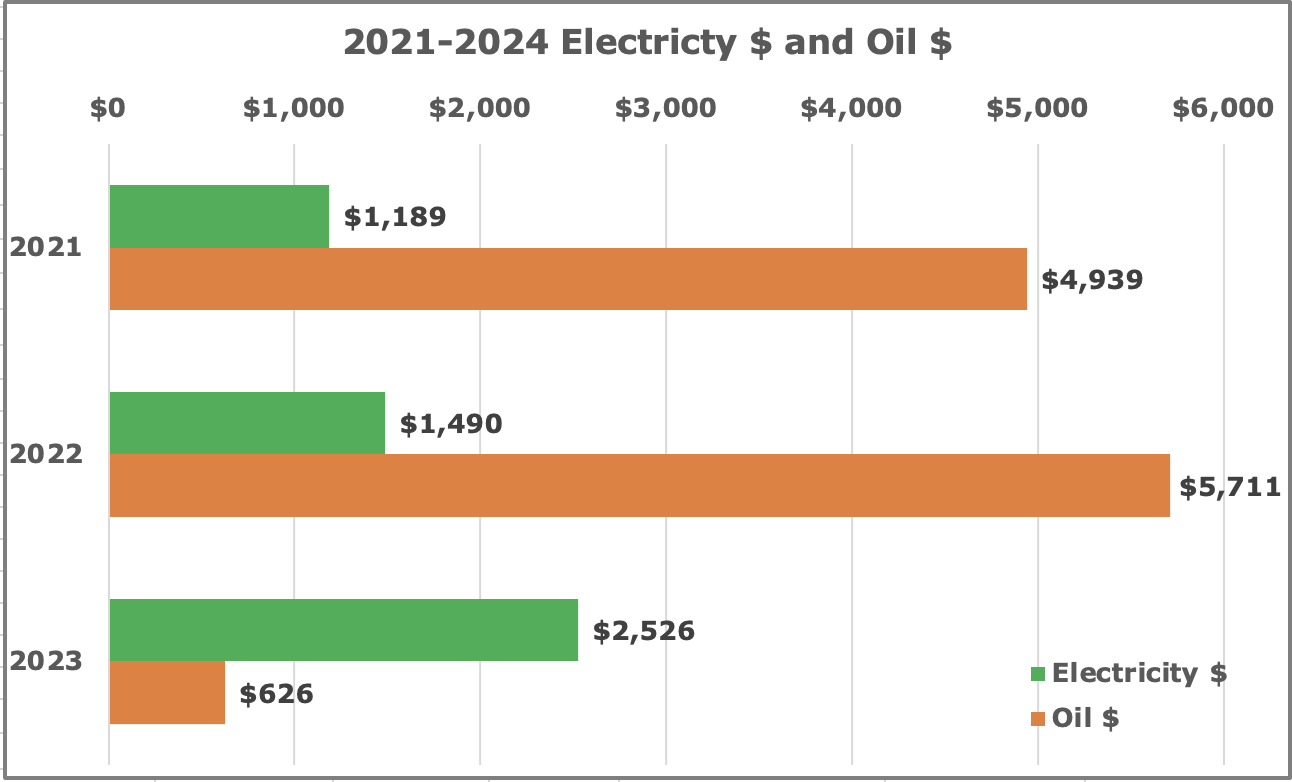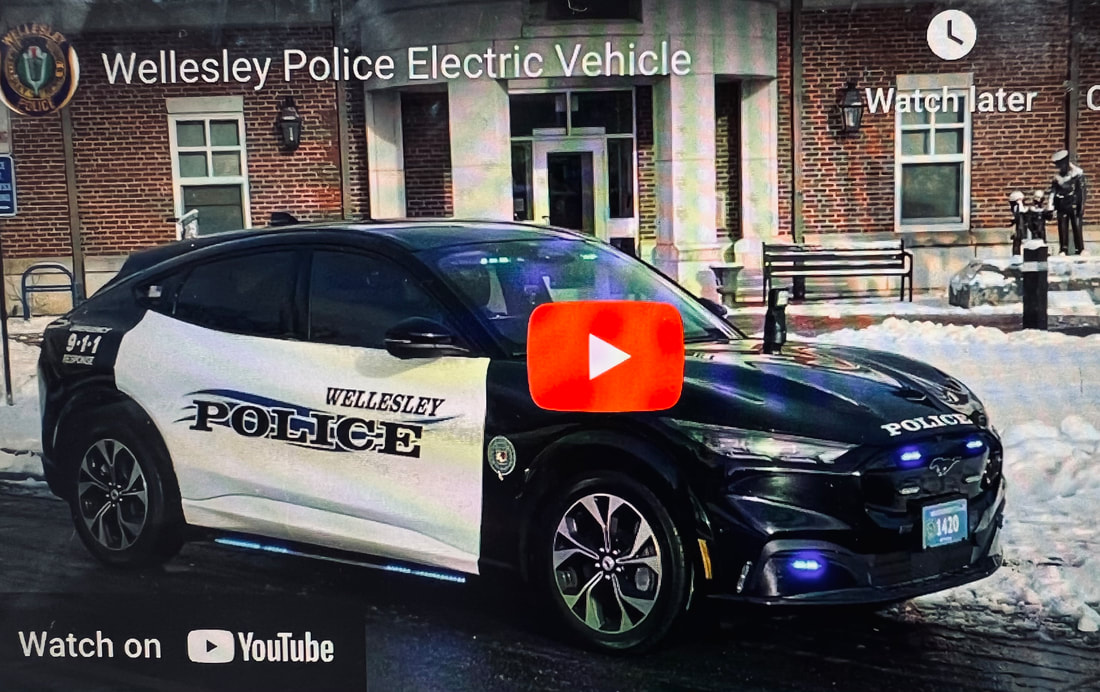|
Thank you to Michael M. for sharing his story about converting to electric from oil and the costs savings.
After attending a Town-sponsored webinar on Air Source Heat Pumps (ASHP), we contacted Abode Energy Management to set up a personal Zoom meeting. Abode spoke to us at length about our particular situation: a 100-year-old home with oil heat and radiators, (no ducting or air conditioning), and discussed what solutions might be available to us. We did learn that we would need to upgrade our electrical system from a 100 AMP to a 200 AMP service, and we worked with an excavator, an electrician, and the Town to make that happen. This was less complicated than it sounds. Abode then directed us to the Town's website for a list of approved vendors for ASHPs, and we contacted two of them. Both came to our home and provided a detailed installation proposal and quote. Each vendor proposed unique configurations and different equipment manufacturers. Abode reviewed both proposals to ensure they would be sufficient to heat and cool our home - with no backup system. While Abode deemed both proposals would do the job, they helped us compare them, and even tweaked them, so we felt comfortable moving forward. We chose Endless Energy to install an LG system with two heat pumps. Our first floor has ductless floor units, (as we were sensitive to maintaining the character of our home), the second floor is a ducted system with vents in the ceiling and the air handler in the attic. Our install was completed in December of 2022. We have been very pleased with our conversion to electric from oil. The units are quiet and remote-controllable. Our home maintained a comfortable temperature throughout the past two winters, and it was pure joy to turn on the AC last summer, vs. having to lug heavy, (and noisy and energy-inefficient), window units down from the hot attic. Many people had suggested we keep a "back-up" system for cold days, but with our two heat pumps that has not been necessary. After a severe cold spell two winters ago when the temperature dipped below -10 degrees for two nights in a row and we stayed warm, we removed our furnace, oil tank and radiators. (This required us to replace our oil-powered hot water heater with a heat-pump hot water heater. Abode again assisted us, and we decided on a 55-gallon Bradford White model; we've been very pleased with its performance.) A side benefit of removing the radiators was freeing up lots of floor space in our home. This made a big difference in every room, but especially in our dining room and in a narrow passageway. Finally, the cost savings have been even more dramatic than we had planned. Our energy bills are coming in at less than half of what we have been paying, thanks in part to Wellesley's favorable electric rates, and the high cost of oil. We also realized further savings by discontinuing the insurances on the oil tank, the annual furnace maintenance, and annual chimney cleaning. Abode also assisted us in claiming $10,000 in rebates. Suffice it to say it was a good installation experience all around thanks to the Town, Abode, and Endless Energy, and it's been a great fossil-free solution for heating and hot water, with the added bonus of air conditioning, for our historic home. Learn About Wellesley’s New Schools’ Sustainability Features {Offering Inspiration for Residents}1/5/2023
Gain insight -- and inspiration too -- about the sustainable design of Wellesley's 2 new public school buildings at January 19th Wellesley Green School Meeting at 10am in the Wakelin Room at the Wellesley Free Library. The Town of Wellesley voted on a greenhouse gas reduction (GHG) goal and has a Climate Action Plan (CAP) to meet that goal. Part of reaching that goal means reducing the energy use in buildings - at 61% they are the largest contributor to GHG emissions in Wellesley. Thus, the way new buildings in town are built is very important.
The Hunnewell and Hardy Schools are Wellesley’s newest school buildings being built and they have many sustainability measures included in the electric buildings. They have been designed to not only lower energy costs and make the buildings more comfortable and healthier for occupants, but to offer a welcomed connection to the outdoors. Fred Bunger, Wellesley Climate Action Committee member, will discuss the sustainability elements of design for both schools, what will be included in the finished project, as well as plans for occupant training and behavior to maintain the environmental goals. Learn more about the thoughtful designs that will inspire you for your home. All are welcome to the January 19th Wellesley Green School Meeting at 10am in the Wakelin Room at the Wellesley Free Library. This event is brought to you by Wellesley’s Climate Action Committee and Wellesley Green Schools. A goal to reduce emissions to net-zero by 2050 has been established by the United States, the state of Massachusetts and the town of Wellesley. There is something for everyone to learn and do to help Wellesley reach its GHG emissions reduction goal and save money, while lowering your heating and cooling costs. "Quest for Quiet"
Join a Lunchtime Conference Series presented by Quiet Communities Environmental noise threatens the health of millions of Americans, especially those in low income and minority communities. Harmful noise emanates from sources including air, road, and rail transportation, construction, land care, industry and even recreation and entertainment venues. Often it is associated with harmful pollution. The lack of effective federal and state programs to help abate noise makes it critical for communities to work together to share ideas, resources, and success stories and encourage our governments to re-establish noise abatement and control programs. In this conference you will learn as well, as help build a community network that can work together to reduce noise in our communities. Brief speaker presentations will be followed by an interactive discussion. Part 1 - Setting the Stage
Register Join the meeting if you are interested in making our communities quieter and healthier. Yes; Quiet Communities -- the Mass. non profit -- are the ones that led Wellesley's Quiet, Healthy Yards, A Regional Residential Land Care Workshop last spring. |
Categories
All
|
Sign up for updates! |
Contact |
Support us! |
Follow us!Copyright © 2024 By Sustainable Wellesley
|




 RSS Feed
RSS Feed